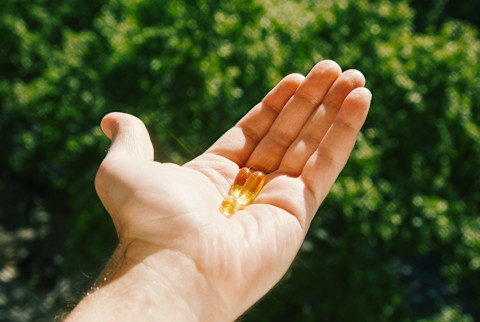Does Your Fish Oil Taste, Uh, Fishy? Here's How To Prevent That

One of the biggest complaints with fish oil supplements is, well, a fishy flavor—quite a few options leave a sour aftertaste, which often deters many from sticking to a daily omega-3 fish oil supplement in the first place. Sure, getting an adequate amount of omega-3s is crucial for supporting your heart, brain, eyes, joints, and so much more,* but a fishy flavor profile is pretty difficult to ignore—as are the dreaded fish burps.
Well, according to mbg's director of scientific affairs and in-house nutritionist Ashley Jordan Ferira, Ph.D., RDN, not all fish oil supplements have that foul flavor (in fact, the good ones don't!). "One of the most common myths I hear is, 'I don't like fish oil, because it's fishy,'" she says on the mindbodygreen podcast. Here's how to freshen yours up.
What it means if your fish oil tastes fishy.
According to Ferira, a good-quality fish oil supplement won't actually taste fishy. "If your fish oil smells funny—fishy, sour, or it's very yellow—these are signs of bad purity," she says. "It's a sign of oxidation. It can go rancid—that's the case with any liquid oil." Just like the olive oil sitting on your kitchen counter, a fish oil supplement can lose its freshness over time.
And if your supplement contains lower-quality oils, it can go rancid even quicker, as those lower-quality oils have higher oxidation and contaminant levels. "[Some brands] will brag about having salmon or some expensive-sounding fish, but, in fact, they're spiking it with lower-quality and less expensive fishes," she notes. "It is common."
Finally, there's the production and transportation piece of the pie (like global shipment processes). For example, if a brand sources fish oil from all over the world and lets it sit on a hot ship for months (especially these days, with global supply chain challenges) before finally formulating it into a product, "there's a lot of potential for oxidation and reduced shelf life," says Ferira—especially if those oils are lower quality to begin with.
What to do about it.
First things first: Make sure your fish oil supplement contains pure, high-quality oils formulated from catch to capsule (i.e., not going from point A to B to C to D, etc., on hot ships). For example, the pure fish oil in our omega-3 potency+ is sourced from cold-water, wild-caught fish in the South Pacific.
After this sustainable sourcing, then the state-of-the-art facility in Chile uses 100% solar energy to extract the oil in its purest and most bioavailable triglyceride form; then it heads straight to the U.S. (i.e., smaller carbon footprint) to be encapsulated in our bovine softgel. And according to Ferira, this capsule will be between clear and only slightly yellow—never sunny yellow or sour-smelling. Why? "The clarity of your fish oil is directly tied to its purity and quality," explains Ferira.
Then there's the dreaded burp-back: While fish oil shouldn't make you burp (that's a sign you may be dealing with a low-quality oil or depending on the burp frequency, maybe a GI issue a doctor should check out), people can burp for a number of physiologic reasons throughout the day. And if you do, chances are you don't want to experience any fishy flavor. So in addition to finding a fish oil with super-low oxidation parameters and contaminant levels, Ferira recommends seeking out a thoughtful fish oil formula that folds in extra botanicals to increase freshness.
That's why you'll see lemon oil and rosemary extract featured in our formula: "Aside from actually delivering antioxidant properties from this citrus plant, if you were to burp, [lemon oil] is helping it to be a pleasant, fresh-tasting experience," says Ferira. The rosemary extract also increases freshness and stability over time—which helps keep the product from going rancid and, thus, tasting fishy. "We hope that the people who stopped taking their fish oil because of the fear of the burp-back phenomenon, we have you covered," says Ferira. "Why don't you give it a go again?"
The takeaway.
If you're concerned about a fishy flavor with omega-3 supplements, rest assured, a high-quality product won't have any off aftertaste, murkiness, or be very yellow. Not only will good-quality oils stay fresh for longer (and rancidity is often the culprit of fishiness), but formulas that go the extra mile will include botanicals to further enhance the antioxidant capacity and flavor experience.

